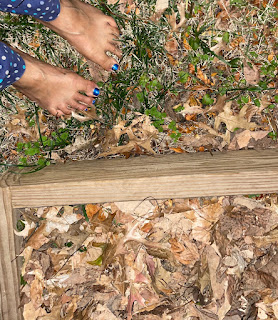My daughters requested a real Christmas tree.
We have a perfectly serviceable fake tree in the basement already decorated with colored lights, jewel toned ornaments and slivered in silver tinsel. It was a gift from a friend moving, eager to travel light. And you know I prefer used goods-even cast offs-over newly manufactured anything.
But a real tree?
Here's my dilemma. What ecosystems were exterminated to plant acres of fir, spruce and pine? What chemical inputs were required to force it to grow into marketable shapes and sizes? How far did it have to travel to get to a store near me? What chemicals were used to keep it fresh? Was it shipped in refrigerated trucks like fruits and vegetables? That all seems ecologically obscene when we've been averaging 50 degree weather this December in Missouri.
Besides, what will I do with it after Christmas? If it's loaded with chemicals, I don't want to compost it or toss it in the backyard for critters to nibble on. I don't want it decomposing near my garden beds and I definitely don't want to landfill organic matter.
Finally though, with Christmas barreling toward me faster than I'm ever prepared for, I caved and went to a nearby nursery. I found one that was just right. Well, just right in a Charlie Brown Christmas way: small and spindly. It shivered in a corner with another scrawny scrap of a fir, reminding me of myself and a friend in grade school, the leftover kids who never got picked for kickball.
I took home the discounted, desiccated tree to decorate. When my girls were little we cut holiday cards into strips to made a chain. This long homemade garland and tiny white lights seemed a perfect adornment for the gangly fir. When finished I sat in the darkened living room enjoying the Charlie Brown vibe, white lights gracing the room with a soft glow.
Then I remembered.
To secure the tree, I bored screws into four sides of it, shredding bark in the process. Trees feel. They have families, form diverse communities, take care of each other. I imagined rows upon rows of firs just like this one in monocrop plantations across the country. Indentured. Trees bred to be consumed. Then discarded.
Even my environmental concerns about a live tree regarded it as an object; without the sentience Indigenous peoples have always revered about plants and animals that science is just now beginning to recognize. I felt disconnect between the land acknowledgement ritual I'd recently created and the Christmas ritual I'd just participated in.
To force a being to grow in unnatural conditions, kill her then artificially keep her 'fresh' to adorn and display her for one's enjoyment to eventually discard her, is a sacrilege akin to pornography. A tree is a living being with a right to her own life.
Not only does the common Christmas refrain, "glory to god in the highest and on earth peace, goodwill toward men," exclude certain people, it discounts nonhumans. Those who fall outside the scope can then be othered: dominated, abused, used, enslaved, marginalized, even killed for the 'glory of the most high.' Progeny of this god-Judaism, Christianity and Islam-have littered history with those they've judged underserving of good will. The legacy continues as good will is still not extended to all beings, let alone all humans. I wonder at the self-serving demarcations, this fabricated scarcity, as though there's a limited supply of Divine good will, as though Sacredness doesn't pulse and shimmer in every speck of Earth.
This startles me. If Divinity is the fabric of everything, why don't our Christmas traditions reflect that? Why participate in rituals that even subjugate other beings? What's more, these traditions-the trees, lights, decorations, overindulgence of food and presents, grand religious services-rely on extractive practices that not only don't foster good will or peace on earth but actually jeopardize others to provide material accouterments for the holiday season. How does that honor the Divine?
Should we not pause such celebrations, such rituals, until we upend systems of oppression? Couldn't our traditions create systems that honor the ever-presence of Sacredness instead? My entire life I've been told it's not that black and white, not an either or. We can celebrate while we pray for those suffering. Maybe adopt a family, volunteer, donate. I'm weary of this equivocation. Inequity, marginalization and suffering flourish, not peace on earth and good will. If the Christ child was supposed to be revolutionary, it's not working. That miracle is simply pimped to uphold oppressive, marginalizing systems while a few get to feel virtuous for their charitable deeds. Is this what the Divine calls us to?
How do we endure Holiness being tortured, trafficked, caged, incarcerated, raped? How do we celebrate the Sacred while species go extinct? While the number of refugees, human and other, increases? While millions, human and other, go without food, water or shelter? Maybe we gaze heavenward to seek Divinity in order to avert our gaze from what we're doing here on Earth to each other and to ourselves.
To be complicit in the desecration of Earth and Her Beings, to deny the Sacred in its wondrous ubiquity means we first learned to deny our own Holiness. 2021 has been a journey toward my inner Divine, which means it's also been a journey toward understanding Divinity as the fabric we are each knit from. Which means we ourselves and all we come in contact with are holy beings, deserving of reverence.
The anemic fir in my living room bolted to a tree stand is propped up on a plastic yellow milk crate hidden under a snowman tree skirt to give her height. It is time for new rituals. Let's develop traditions to honor the Sacred within and in every being so we can authentically manifest good will toward each and every being. Indeed, Divine will. Then we'd have a chance at peace on and with Earth.









